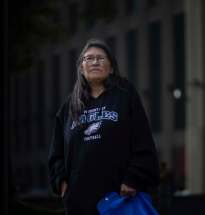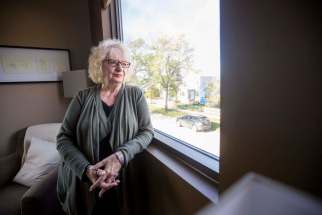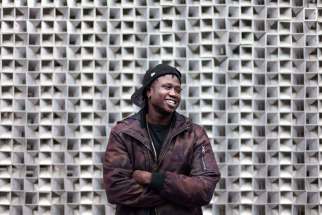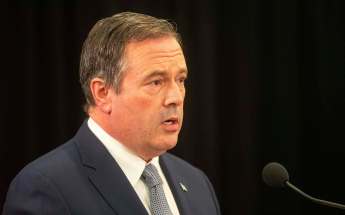BMO reconciliation ‘sales gimmick’ angers unwelcome Indigenous woman Security guard evicts prospective customer twice in two weeks at Portage and Main branch, including moments before scheduled appointment with manager
Read this article for free:
or
Already have an account? Log in here »
To continue reading, please subscribe:
Monthly Digital Subscription
$0 for the first 4 weeks*
- Enjoy unlimited reading on winnipegfreepress.com
- Read the E-Edition, our digital replica newspaper
- Access News Break, our award-winning app
- Play interactive puzzles
*No charge for 4 weeks then price increases to the regular rate of $19.00 plus GST every four weeks. Offer available to new and qualified returning subscribers only. Cancel any time.
Monthly Digital Subscription
$4.75/week*
- Enjoy unlimited reading on winnipegfreepress.com
- Read the E-Edition, our digital replica newspaper
- Access News Break, our award-winning app
- Play interactive puzzles
*Billed as $19 plus GST every four weeks. Cancel any time.
To continue reading, please subscribe:
Add Free Press access to your Brandon Sun subscription for only an additional
$1 for the first 4 weeks*
*Your next subscription payment will increase by $1.00 and you will be charged $16.99 plus GST for four weeks. After four weeks, your payment will increase to $23.99 plus GST every four weeks.
Read unlimited articles for free today:
or
Already have an account? Log in here »
Hey there, time traveller!
This article was published 18/10/2021 (1510 days ago), so information in it may no longer be current.
An Indigenous woman is accusing BMO of using reconciliation as a “sales gimmick” after she said she was harassed and asked to leave by security at the Portage and Main branch twice in a month.
Vivian Ketchum, a 57-year-old residential school survivor, said it was, ironically, a poster outside the bank’s main branch at 201 Portage Ave., promoting reconciliation that inspired her to enter in the first place on Sept. 27 following a dentist appointment.

Almost immediately, Ketchum said, she was approached by security, who asked if she was there to do any banking. When she replied that she wasn’t, but was considering switching banks, they asked her to leave.
“He maybe thought I was drunk, because I was slurring my words that first time, and I was staggering a little, but I’ve got issues with my leg and my mouth was frozen,” she said. “I was not drunk. I’d just sold my condo and I was thinking about switching banks… I didn’t deserve to be treated that way.”
She was upset after leaving and went back inside, where she said she attempted to speak with an employee, but a security guard interfered, and she left.
In an attempt to rectify the situation, she scheduled a meeting about 10 days later to discuss the incident with the branch manager. While sitting on a couch in the lobby waiting for her appointment on Oct. 9, she was shocked when the same security guard approached and asked her to leave again.
“He maybe thought I was drunk, because I was slurring my words that first time, and I was staggering a little, but I’ve got issues with my leg and my mouth was frozen.”
– Vivian Ketchum
Ketchum said the branch manager called her while she was walking away from the building, asked her to return and apologized, but she did not receive an apology from the security guard.
She received a cup of coffee and a BMO goody bag with candy inside.
“How many times do I have to be thrown out before (the security guard) is let go? And if he’s behaved this way to me, how many times has he done this to other Indigenous people who don’t have a voice?” she said.
“I’m angry that they use healing reconciliation as a sales gimmick. That’s all it is, a sales gimmick — not working toward a better relationship with Indigenous people.”
Last year, BMO apologized for an incident in B.C. after an Indigenous 12-year-old girl and her grandfather were handcuffed while trying to open an account at a Vancouver branch. At the time, a human-rights complaint was filed and BMO Financial Group established an Indigenous advisory council in response.
“I’m angry that they use healing reconciliation as a sales gimmick. That’s all it is, a sales gimmick– not working toward a better relationship with Indigenous people.”
– Vivian Ketchum
Academic and research director for the National Centre for Truth and Reconciliation Brenda Gunn said while the process of education and changing people’s attitudes is going to take time, accountability needs to come from Canadian companies’ leadership to ensure the process is a consistent top priority.
“It’s important for corporations to not only do cultural competency training with their staff and employees, but to really ensure they’re changing the systems within their business to really take anti-racism seriously,” she said.
“By this, I mean we need to make sure that cultural competency is viewed as a hard skill, in job applications we need to make sure that performance evaluations include these competencies and make sure that complaints are taken seriously.”
Ketchum said she’s speaking out about what happened in hopes that BMO will make changes and to spread awareness that regardless of what efforts a company promotes, its actions can be harmful to people they claim to support.
“I’m a residential school survivor, and the words draw me in. And the security guard’s actions, unfortunately, put the walls back up,” she said.
“‘We’re listening’; there’s a big poster about how they’re going to listen and everything, but they don’t walk the talk.”
The incident occurred three days before thousands took to the streets in Winnipeg and across Canada on the first national Day for Truth and Reconciliation.
“I thought there was going to be a push forward, a healing reconciliation push forward, and I was so disappointed,” she said.
“I’m not hurt, I’m angry. I’m angry that this happened. Reconciliation means a lot to me — it’s not just a word.”
“We are committed to treating all our customers with fairness, dignity, sensitivity and respect. We regret that this experience has happened.”
– BMO Financial Group spokesperson email
A spokesperson from BMO Financial Group said the bank first learned of the incident from the Free Press Monday.
“We are committed to treating all our customers with fairness, dignity, sensitivity and respect,” he wrote in an email.
“We regret that this experience has happened.”
malak.abas@freepress.mb.ca
Twitter: malakabas_

Our newsroom depends on a growing audience of readers to power our journalism. If you are not a paid reader, please consider becoming a subscriber.
Our newsroom depends on its audience of readers to power our journalism. Thank you for your support.








